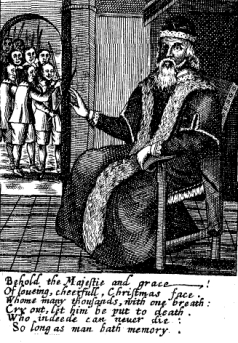It is now 32 years since I may have ruined a kid’s faith in his father.
I was a newscaster at CKDA Radio in Victoria, BC, and I ran a story about psychologists giving advice on how to explain the “Santa Claus myth” to one’s children.
I came out of the newsroom to find my colleague, Al Siebring, in a heated discussion on the phone. “Yes, but why did you lie to your kid?” Al challenged the caller.

- from The Tryal of Old Father Christmas, by Josiah King, 1658
Apparently, this caller’s child had heard the story and the reference to Santa as a “myth” and was devastated. But Al had a point: the child had been lied-to, and the perpetrator was not the guy on the radio. (Two other thoughts occurred to me afterwards: how would a child intelligent enough to know what “myth” meant not have figured out the truth about Santa Claus; and it’s possible that the caller was a pre-Internet troll, waiting for a chance to gripe about something someone said on radio. Heaven knows, there are enough of them.)
I ate a little crow the next day and read the famous “
Yes, Virginia, There Is A Santa Claus!” editorial from the New York Sun, September 21, 1897. (The editorial loses its curve when it says one might as well not believe in fairies, but the key point gets through.)
And the debate is underway again, and probably will continue until Jesus comes back and settles things once and for all. Certainly, there’s concern that, with Christmercialization going on unabated in our world today, you’d think Santa had supplanted Jesus as the reason for the season. Some people take a cue from Dana Carvey’s “Church Lady”, who noted that “SANTA” and “SATAN” are anagrams. But I don’t buy into that. After all, the true spirit that Santa Claus represents cannot exist satanically. When my children would ask, “Is Santa Claus real?”, we’d always tell them, “The spirit he represents is real”. It’s a spirit of selfless giving, of caring for children, and of believing for miracles.
But all of that exists not because Santa Claus – or the original Saint Nicholas – is a “good guy”. Unless giving, is motivated by Christ – the anointing – it’s invariably dictated by convenience. We’ll give so long as it’s convenient – or makes us look good. True selflessness in giving is motivated by “Christ in us”: the same motivation which drags us out of bed at an unseemly hour to see someone, take someone someplace, or help in a disaster.
That motivation necessarily drives out Satan, and Satan cannot cast out Satan. So if Santa has been given a position in which he is the object of worship at this time of year, that’s our problem – not Santa’s. Same with the part of this legend that encourages parents to lie to their kids: as Ms Stock writes (and may have been experienced all those years ago in Victoria), how many children have had the trust they had in their parents shattered when they found out that all those cookie crumbs, footprints in ash in the carpet by the fireplace and “if you don’t go to bed, Santa won’t come”, were all part of an elaborate lie?
Of course, we can change that. Santa Claus, indeed, should symbolize a mortal man whose life and deeds exemplify “Christ in us”. That, I think, is really where Christian parents should go when their kids ask that inevitable question.
And then there’s the Christmas tree.
Some people sanctimoniously remind us that the tree was originally a pagan symbol, and co-opted by Christians to attract pagans to the faith. Some feel it, like Santa, has become an idol, supplanting God as an object of worship. But regardless of its origins, a symbol is what we make it and to me, the Christmas tree symbolizes what God did on that day, just over 2000 years ago.
Indeed, the Christmas tree is hardly alone as an “adopted” symbol. It’s similar to St Patrick, using the shamrock to illustrate the Trinity. And the very first Canadian Christmas Carol, the hauntingly beautiful “Huron Carol”, sings of the “Mighty Gitchi Manitou” sending angel choirs during the “moon of wintertime”. Or Larry Norman using rock ‘n’ roll to reach young people with the message of Jesus.
Here’s what the Christmas tree means to me. It’s an evergreen: its colour never changes – just as God’s Word is eternal. (Isaiah used the image of a cedar — an evergreen — in Chapter 5 to describe the coming of the Messiah.) It stands, rooted to the spot, immobile, just as God Word stays planted and firm. We’re the ones who go traipsing off in all directions, following our whims and lusts of the world, and it’s up to us to come back to the tree.
Thus says the Lord God: “I will take also one of the highest branches of the high cedar and set it out. I will crop off from the topmost of its young twigs a tender one, and will plant it on a high and prominent mountain on the mountain height of Israel I will plant it; ad it will bring forth boughs and bear fruit, and be a majestic cedar. Under it will dwell birds of every sort; in the shadow of its branches they will dwell. (Ezekiel 17:22-23
The tree reaches up to Heaven, and its branches reach out – which is what God did when He sent His son to be with us, stretching forth His mighty right hand (Jesus sits on the right hand of God, remember?) to bless and empower us.
It’s similar to the symbolism of Jesus’ calling fishermen to be the first Apostles: they understood the concept of standing in their own element — on land or in their boat — and casting their lines or their nets into another element. So, too, God cast His net into our element (the world) while staying put in His (Heaven).
God uses any means possible to get through to us. Just as with Paul, who picked up on the monument “to the unknown god” when he spoke at Mars Hill (Acts 17:16-34), God will send someone who can use pre-existing objects of worship as a basis for proclaiming the truth of the One True God. It could be a nameless monument, a tree, a shamrock, or a fat guy in a red suit.




 that I’d asked for (and which “only” cost $300.00 back in 1967) and the year that the girl who’d just dumped me in the first week of December did not call up and say, “Merry Christmas! Let’s get back together!” I think I stayed close to the phone much of the day — just in case.
that I’d asked for (and which “only” cost $300.00 back in 1967) and the year that the girl who’d just dumped me in the first week of December did not call up and say, “Merry Christmas! Let’s get back together!” I think I stayed close to the phone much of the day — just in case.



